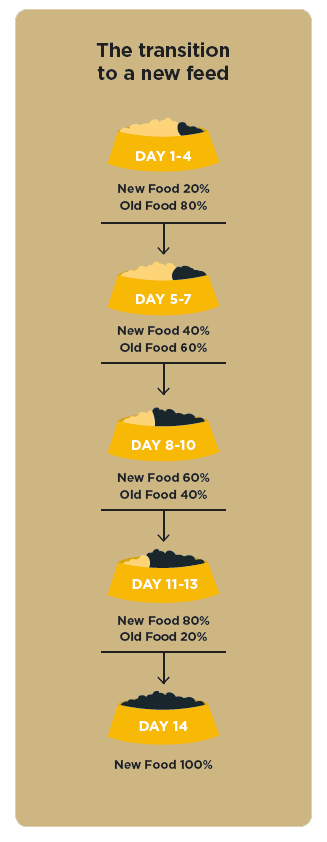Bringing home a new puppy is an exciting time, but it also means a lot of new responsibilities.
Taking care of the latest addition to your household isn’t always easy, particularly in the first 12 months. This article offers a few tips to help ease some of the stress and provide some guidance with one of your most important new roles – feeding your puppy properly.
Why is the right nutrition important for puppies?
Nutrition is critical during the puppy stage. This formative phase sets the foundation for the rest of your dog’s life, and what your puppy eats in this time has a direct effect on their growth, skeletal development and immune system. It’s important to be aware that the length of time a dog is classified as a puppy can vary depending on the breed. Larger or giant breeds can take up to two years before they are classified as an adult. For all other dogs, the general rule of thumb is 12 months, or when they reach approximately 90% of their expected adult body weight.
While your dog is still a puppy, their diet will need to support rapid physical development:
- Bones and joints growing to full size
- Muscles developing and growing
- Internal organs growing (this continues even after your dog has reached adult size)
- Immune system developing and learning to protect the body
- Cognitive development and brain growth.
Do they need specific puppy food?
A puppy needs a food that is specifically formulated to meet their growing needs. Compared to an adult dog, puppies require a diet that contains higher levels of protein and fat. Their diet needs to have the correct balanced levels of protein, fat, calcium and phosphorus as well as vitamins and minerals. This will make sure they meet all the nutritional requirements to achieve all their growth and development milestones. A diet which does not offer these crucial nutrients in the right proportions can result in deficiencies, which can impact on your puppy’s health and growth.
A good puppy food will offer a formulated balance of key nutrients:
- Protein: The key building blocks of muscle, skin, coat, organs and other tissues. Puppies will need abundant levels of protein during periods of growth.
- Carbohydrates: Include sugars, starches and fibre, which are essential for providing energy for growing puppies. Certain types of fibre, like beet pulp, also help to improve gastrointestinal function.
- Omega fatty acids: Promotes a healthy immune system and helps to keep your puppy’s skin and coat healthy. Docosahexaenoic acid (DHA) helps with cognitive development in puppies.
- Vitamins and minerals: Essential to dogs for cell regeneration, bone formation, muscle growth and a variety of other functions.

How and when should I feed my puppy?
When it comes to feeding your puppy, always follow the guidelines on the dog food you are using, and adjust according to your puppy’s appetite and body condition.
Generally, puppies should be offered food up to four times a day to begin with. Gradually decreasing the number of meals down to two as they grow. It’s best to establish a routine with your puppy and feed them at set times each day rather than leaving food out at all times. The exception to this is tiny/petite breeds, who should always have food available.
Importantly, always ensure that your puppy has access to clean and fresh drinking water. Change the water in their bowl regularly as puppies do have a tendency to play in their water bowls.
Feeding guidelines for puppies

When should I change my puppy’s food?
When you first bring your puppy home, it can be a very stressful time for them, which can lead to gastrointestinal upset. To minimise any tummy troubles for your new puppy, it’s best to keep feeding them the same food they were fed before you brought them home, so be sure to ask what it is or ask for a sample. If you do decide to change your puppy’s food, make sure that you gradually transition to the new food over at least a 7 to 10-day period.
The nutritional needs of your puppy will also change as they get older. As your puppy reaches adulthood, it’s important to transition them over onto an adult dog food. When changing your dog’s diet, make sure to gradually mix and transition the food over and transition the food over.
If at any time during the transition your dog experiences any tummy upsets, such as vomiting or runny stools, the transition should be stopped. You can resume when any gastrointestinal upset has settled.
by Dr Emma Bradbury


